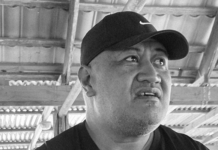The Trump administration is pressuring Tonga and 35 other countries to accept foreign deportees from the U.S. or face a potential travel ban on its citizens, according to a leaked memo we and US media have reported recently.
The U.S. Supreme Court’s decision this week allowed the Trump administration to resume deporting migrants to countries other than their homelands.
The memo described these countries as being involved in “widespread government fraud” and stated that the goal was to improve immigration cooperation, specifically by accepting foreign deportees sent by U.S. authorities and reducing the number of citizens overstaying their visas in the United States.
No information is currently available regarding whether Tonga was warned of all the criteria of the demands or only some of them.
Tonga’s Prime Minister, Dr. ‘Aisake Eke, confirmed that the government received the official warning but did not provide specific details, stating there was no clear timeframe, although the memo reportedly mentioned a 60-day response period.
“We are seriously alarmed by this development,” he said, adding that Tonga’s Ministry of Foreign Affairs is working with the U.S. Consulate in Nuku’alofa to formulate a response.
Prime Minister Eke was one of the first Pacific leaders to criticise the Trump Administration’s move early this year to deport hundreds of thousands of overstayers and criminals from the United States.
Dr Eke expressed concern that Tonga was already struggling with the effects of such deportees, particularly those with criminal records from the U.S., and said the country was in a state of uncertainty over the issue.
What would happen if the U.S. sent foreign deportees to Tonga?
As previously reported by Kaniva News, deportees arriving in Tonga, particularly those who committed crimes in the US, are allowed to walk free and live wherever they can find accommodation in the community. There is no law in Tonga to screen or to re-imprison them.
Individuals who had previously been deported to Tonga included those who overstayed their visas in the U.S. Generally, these cases posed few problems, as many had only recently arrived in America and still maintained strong ties to Tonga—homes, families, and close contacts awaited them. Essentially, they were returning to a stable life.
The real concern lies with those who left Tonga as young children, some under the age of 10, and no longer have any family or connections in the country. Many of these people are unfamiliar with Tonga, lack a place to stay, and have limited knowledge of the Tongan language.
Some of these deportees have stepped off the plane with nowhere to go, wandering the roads out of the Fua’amotu International Airport until strangers picked them up, assuming they were heading home, only to realise mid-journey that these deportees had no destination at all. Yet at least they were Tongan.
Now, the Trump administration is pushing to send foreign deportees—people with no ties whatsoever to Tonga. As usual, the Tongan community is left in the dark about the potential criminal histories of these individuals.
Which countries did the US send foreign deportees to?
U.S. and international media report that countries refusing to repatriate their deported nationals from the United States include Mexico, Vietnam, and Cuba.
In response, the Trump administration has redirected these individuals to so-called “third countries”—places they did not originate from, never chose, and where they may not speak the language or know anyone, according to an NBC News investigation.
NBC News quoted Solicitor General D. John Sauer as saying the U.S. government seeks to deport “some of the worst of the worst,” which is why their home countries are “often unwilling to take them back.
The move is part of a broader Trump administration strategy to force countries worldwide to accept deportees, even those who are not their citizens. A recent Supreme Court ruling has expanded the U.S. government’s ability to deport immigrants to third countries, bypassing legal obstacles.
Reports indicate that American diplomats have been instructed to negotiate with nations—including war-torn and rights-abusing regimes—to take in expelled individuals, sometimes offering financial incentives.
Deportation Payoffs & Resistance
Rwanda received $100,000 to accept an Iraqi deportee, while Kosovo agreed to take up to 50 people. Other nations, like Peru, have resisted despite repeated pressure.
Growing concerns are emerging in the U.S. about policy gaps that fail to give deportees adequate opportunity to inform courts if they fear persecution or torture at their destinations.
Reports indicate that in May, the Department of Homeland Security disregarded a court order requiring such protections and deported a group of men to a third country with just one day’s notice.
According to a May New York Times report, the eight men—from Cuba, Laos, Mexico, Burma, Vietnam, and other countries—were initially told they were being sent to war-torn South Sudan. Instead, their plane landed in Djibouti, in eastern Africa.
The government has not disclosed their ultimate destination.
What’s at Stake for Tonga?
If Tonga were asked by the U.S. to consider hosting foreign deportees to avoid being added to a travel blacklist, the likely responses would be either unconditional acceptance or a request for funding – as seen in Rwanda’s case.
Al Jazeera reported in early May that Libya’s National Unity Government, which controls western Libya, stated it rejected the US use of its territory as a destination for deporting migrants without prior knowledge or consent.







